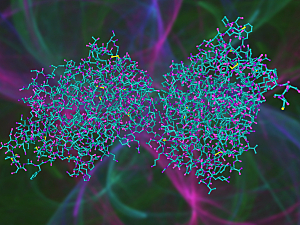Expression of intelectin-1 (ITLN1), a stress-induced lectin produced by intestinal epithelial cells, is increased in patients with ulcerative colitis (UC). Researchers at Brigham and Women’s Hospital recently presented evidence of novel mechanisms by which ITLN1 may affect an individual’s susceptibility to inflammation in the colon.
The authors of the report, published in the Journal of Experimental Medicine, are Richard S. Blumberg, MD, vice-chair for research in the Department of Medicine at Brigham and Women’s Hospital, Jerrold R. Turner, MD, PhD, professor of Pathology and Medicine in the Department of Pathology at Brigham and Women’s Hospital, Jinzhi Duan, PhD, a research fellow in the Department of Medicine, and Juan D. Matute, MD, a neonatologist at Mass General for Children.
Increased ITLN1 Correlates With Unfolded Protein Response
Using an RNA-sequencing dataset of mucosal biopsies, the researchers confirmed ITLN1 expression was increased in treatment-naive patients with UC, compared with controls, regardless of whether samples were obtained during active disease or remission.
Furthermore, ITLN1 levels were positively associated with hallmark genes of unfolded protein response (UPR) activation. Endoplasmic reticulum stress and UPR activation are commonly increased in UC and Crohn’s disease, and this latest finding suggests that UPR directly regulates ITLN1 expression at the transcriptional level.
Mouse Models
To study ITLN1 in vivo, the team generated a knockout animal model of ITLN and a transgenic mouse model where ITLN1 expression was driven by a promoter called Villin-1. The transgenic mice proved to overexpress ITLN1 in a distribution within intestinal epithelial cells that recapitulated human UC. Key findings were that:
- ITLN1 bound a select group of fecal microbes, most prominently Akkermansia muciniphila, a mucin-degrading bacterium using a novel method called Lectin-sequencing or Lectin-Seq
- Overexpression of ITLN1 reduced the thickness of the inner colonic mucus layer in a microbiota-dependent manner, facilitating penetration of A. muciniphila into the inner mucus layer and resulting in further thinning of the layer
- The increased susceptibility to colitis associated with overexpression of ITLN1 was ameliorated by eradicating A. muciniphila with tetracycline
Together, these results suggest how ITLN1 contributes to UC pathogenesis: it modifies the structure of the colonic inner mucus layer and overall susceptibility to intestinal inflammation and injury in concert with certain microbes known to have mucolytic activity.
